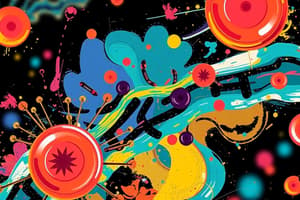Podcast
Questions and Answers
Which of the following drugs is classified as a thienopyridine?
Which of the following drugs is classified as a thienopyridine?
- Abciximab
- Eptifibatide
- Ticlopidine (correct)
- Aspirin
What is the mechanism of action of GP IIb/IIIa inhibitors?
What is the mechanism of action of GP IIb/IIIa inhibitors?
- Inhibition of thrombin
- Inhibition of vitamin K
- Inhibition of platelet aggregation (correct)
- Activation of ADP
Which of the following anticoagulants primarily acts on Factor Xa?
Which of the following anticoagulants primarily acts on Factor Xa?
- Hirudin
- Heparin
- Warfarin
- Xabanes (correct)
What are the side effects commonly associated with Ticlopidine?
What are the side effects commonly associated with Ticlopidine?
Which drug is considered the gold standard for diagnosing pulmonary embolism?
Which drug is considered the gold standard for diagnosing pulmonary embolism?
Which anticoagulant requires INR monitoring during treatment?
Which anticoagulant requires INR monitoring during treatment?
Which of the following is a characteristic of Gatranes compared to traditional anticoagulants?
Which of the following is a characteristic of Gatranes compared to traditional anticoagulants?
What is the primary therapeutic use of thrombolytic drugs?
What is the primary therapeutic use of thrombolytic drugs?
Which fibrinolytic drug is known for its relatively long half-life?
Which fibrinolytic drug is known for its relatively long half-life?
Which condition is a contraindication for the use of fibrinolytic drugs?
Which condition is a contraindication for the use of fibrinolytic drugs?
What is the mechanism of action of anticoagulants like heparin?
What is the mechanism of action of anticoagulants like heparin?
Which of the following drugs is a direct thrombin inhibitor?
Which of the following drugs is a direct thrombin inhibitor?
Which of the following statements about NOACs (non-vitamin K antagonist oral anticoagulants) is true?
Which of the following statements about NOACs (non-vitamin K antagonist oral anticoagulants) is true?
Study Notes
Angio-CT
- Gold standard imaging test for pulmonary arteries
Platelet Aggregation
- Platelet aggregation is influenced by various factors:
- Thromboxane A2 (TXA2)
- Adenosine diphosphate (ADP)
- Vasopressin (AVP)
- von Willebrand factor
- Collagen
- Adrenergic system
- Glycoprotein IIb/IIIa receptor
Antiplatelet Drugs
- Aspirin: Inhibits TXA2 synthesis (0.075 - 0.5 mg)
- Ticlopidine: Inhibits ADP (2 x 0.25 mg)
- Clopidogrel: Inhibits ADP (1 x 0.075 mg)
- Prasugrel: Inhibits ADP (loading dose 0.3 - 0.6 - 0.9 mg, maintenance 5 or 10 mg)
- Abciximab: Blocks GP IIb/IIIa receptor (0.25 mg/kg bolus, then 0.125 µg/kg/min)
- Tirofiban, Lamifiban, Fradofiban: Block GP IIb/IIIa receptor (0.01 mg/kg bolus, then 0.15 µg/kg/min)
- Eptifibatid: Blocks GP IIb/IIIa receptor (0.18 mg/kg bolus, then 2 µg/kg/min)
- Prostacyclin analogues: Inhibit platelet aggregation and vasoconstriction
- Ticagrelor: Inhibits ADP
Ticlopidine
- Oldest drug from thienopyridine group
- Side effects:
- Diarrhea
- Neutropenia
- Hyperlipidemia
Anticoagulants
- Heparin: Inhibits thrombin and other coagulation factors (APTT monitoring)
- Low Molecular Weight Heparins (LMH): Enoxaparin, Dalteparin, Nadroparin
- Hirudin and synthetic analogues: Bivalirudin, Lepirudin (APTT monitoring)
- Polysaccharide group: Fondaparinux, Idraparinux
- Antagonists of Vitamin K: Warfarin (INR monitoring), Acenocumarol
- Non-Vitamin K Antagonist Oral Anticoagulants (NOACs):
- Gatranes: Xymelagatran (liver toxicity), Dabigatran
- Xabanes: Riwaroksaban, Apiksaban, Betriksaban, Endoksaban
Coagulation Cascade
- A series of enzymatic reactions leading to the formation of a fibrin clot:
- Factors XIII, XII: Initiate the cascade
- Factor Xa: Converts prothrombin (factor II) to thrombin (factor IIa)
- Thrombin: Converts fibrinogen (factor I) to fibrin
- Factor XIII: Stabilizes the fibrin clot
Anticoagulants and Coagulation Cascade
- Heparin, LMH, Polysaccharide group: Inhibit factor Xa
- Hirudin and analogues: Inhibit thrombin
- Xabanes: Inhibit factor Xa
- Gatranes: Inhibit thrombin
Oral Anticoagulants
- Vitamin K Antagonists: Inhibit the synthesis of coagulation factors II, VII, IX, X in the liver
- INR: International Normalized Ratio, used to monitor warfarin therapy (therapeutic range 2-3.5)
- NOACs: Well tolerated, fewer side effects, do not require INR monitoring
Thrombolytic (Fibrinolytic) Drugs
- Drugs that dissolve existing blood clots by breaking down fibrin
- Used to recanalize occluded blood vessels
Fibrinolytic Drugs
- Plasminogen: Converted to plasmin
- Plasmin: Breaks down fibrin
Fibrinolytic Drugs (Antigenicity)
- Streptokinase: Non-specific fibrinolytic drug
- Anistreplase: Modified streptokinase
- Urokinase: Non-specific fibrinolytic drug
- Alteplase (tPA): Tissue plasminogen activator, more specific fibrinolytic drug
- Tenecteplase (TNK–tPA): Modified tPA
Half-Life of Fibrinolytic Drugs
- Anistreplase: Shortest half-life
- Streptokinase: Moderate half-life
- Urokinase: Moderate half-life
- Alteplase (tPA): Moderate half-life
- Tenecteplase (TNK–tPA): Longest half-life
Therapeutic Uses of Fibrinolytic Drugs
- Acute ischemic stroke
- Acute myocardial infarction
- Acute pulmonary embolism
- Deep vein thrombosis
- Arterial thrombosis
Contraindications for Fibrinolytic Drugs
- Prior intracranial hemorrhage (ICH)
- Known cerebral vascular lesion
- Malignant neoplasm involving the intracranial cavity
- Ischemic stroke within the past 3 months
- Aortic dissection
- Active bleeding
- Pregnancy
Studying That Suits You
Use AI to generate personalized quizzes and flashcards to suit your learning preferences.
Related Documents
Description
This quiz covers key concepts related to Angio-CT as the gold standard for imaging pulmonary arteries, as well as factors influencing platelet aggregation and the various antiplatelet drugs. It examines the mechanisms and doses of medications such as Aspirin, Clopidogrel, and others used in inhibiting platelet aggregation. Test your understanding of these important topics in cardiology and hematology.




